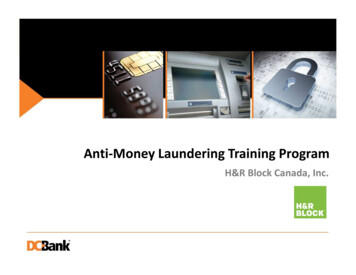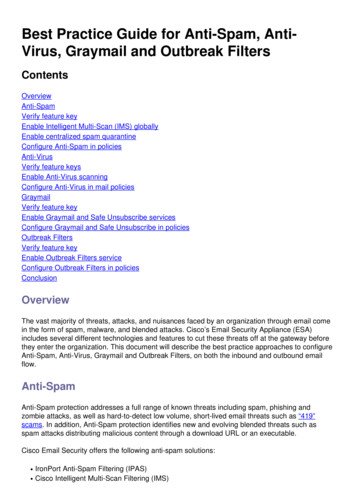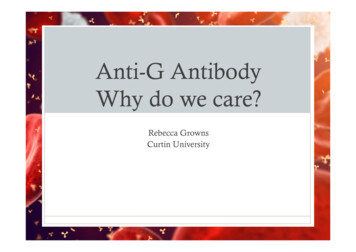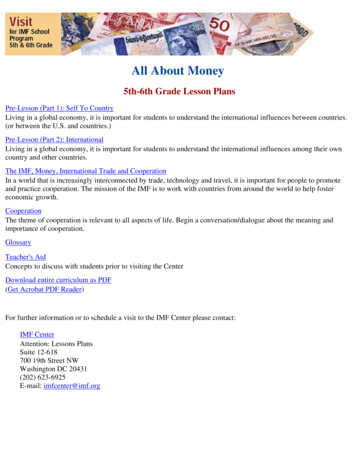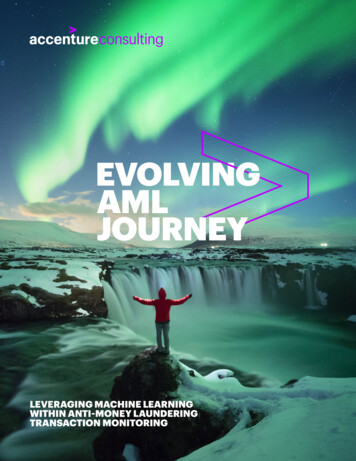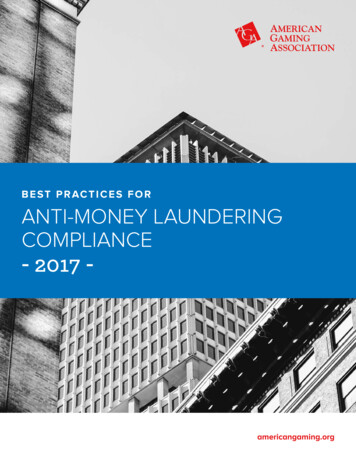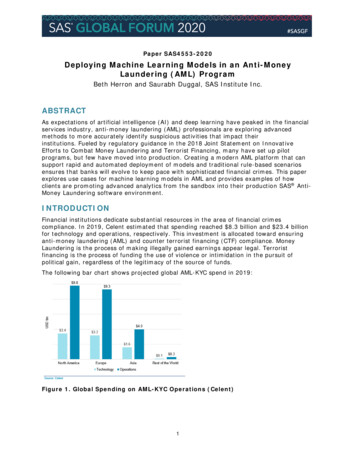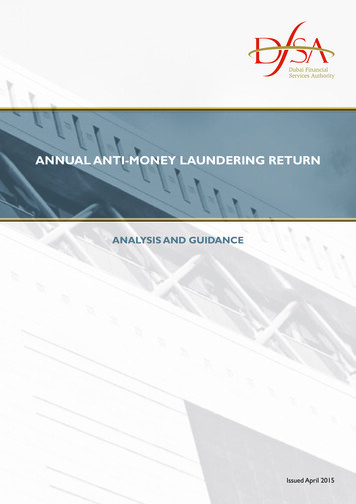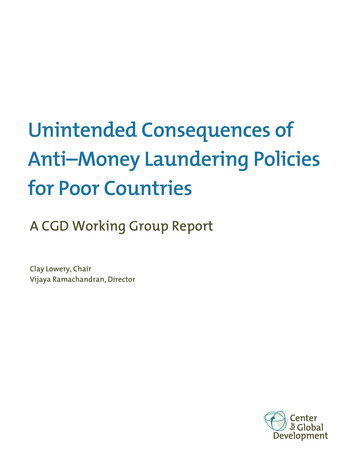
Transcription
Unintended Consequences ofAnti–Money Laundering Policiesfor Poor CountriesA CGD Working Group ReportClay Lowery, ChairVijaya Ramachandran, Director
Unintended Consequences ofAnti–Money Laundering Policiesfor Poor CountriesA CGD Working Group ReportClay Lowery, ChairVijaya Ramachandran, Director
5432Center for Global Development. 2015. Center for Global Development. 2015. Some RightsCreative Commons Attribution-NonCommercial 3.0Center for Global Development2055 L Street, NWWashington DC 20036www.cgdev.org
ContentsWorking Group Members.vAcknowledgements .viExecutive Summary . vii1. Background .1The scope of the problem .1Why do we care? .1Serious offenses .2The policy and regulatory response .3Egregious offences .4The risk-based approach . .5Regulatory harmonization between nations: a FATF success . 6Bureaucratic complexity and inconsistency at the national level:a challenge for FATF . 9The recent increase in regulatory pressure on financial institutions .10De-risking: an industry response . 122. The grand-scale de-banking of remittance providers .15In summary . 15De-banking of MTOs is widespread . .16What is driving de-banking? . 18Scale of de-banking and the impact on industry . . 20Negative impact of de-banking on remittance flows and transparency .22Responses by regulators and other policymakers to date .253. Correspondent bankingand other cross-border transactions under threat . 29In summary . 29The decline of correspondent banking relationships and trade financein some corridors . 29What is driving the reduction in correspondent accounts? . 31Potential consequences .33Response by governments and the banking industry .334. Unintended consequences for non-profit organizations . . 35In summary .35Introduction .35NPOs deliver much of the world’s humanitarian assistance, much ofwhich flows to jurisdictions that are “high risk” . 36NPOs may help in the fight against terrorism . 36NPOs are not inherently “particularly vulnerable” to terroristcapture and abuse . 36Unintended consequences of AML/CFT efforts . .37Unintended Consequences of Anti–Money Laundering Policies for Poor Countriesiii
5. Key problems, solutions and recommendations . 41Problem: Lack of knowledge about the unintended consequencesof AML/CFT . 41Solution: Rigorous assessments at the national and global levelsbased on better data .43Problem: Lack of clarity about risk .47Solution: Strengthen the risk-based approach . 48Problem: Differing MTO and NPO compliance levels and difficultyidentifying instances of effective compliance . . 50Solution: Foster effective compliance with AML/CFT rules andclarify practices for identifying lower risk MTOs and NPOs . 51Problem: The high costs of client identification . .52Solution: Adopt Legal Entity Identifiers, improve national individualidentification schemes, support SWIFT’s ongoing work, and examinesubsidized third party verification . .52Works Cited . 59Appendixes123456Distributed public ledger-based technologies: risks and opportunities . . 67Examples of research strategies . 70Technical discussion of figures . 71Examples of terrorist abuse of NPOs .75MTO Best Practices for AML/CFT Compliance .77Working Group Member Biographies . 79Boxes123Geographical focus of the report.4De-risking and de-banking.16Potential Quick Wins. 42Figures1234567891011Recorded capital flows to developing countries since 1990 ( billion).2FATF Grey and Blacklisting (2000–2015). 6AML-related fines by US regulators (2000–2014). 11AML-related fines by the UK Financial Co. 11AML-related fines by the UK Financial Conduct Authority (2002–2014). 12Recent major de-banking episodes. 17Number of payment institutions operating in the UK. 21Remittance agents and competition in the UK.22The average cost of sending 200*.23AML-related enforcement actions before and after de-risking statements. 26The additional cost of sending money to high-risk* countries.74Tables1234ivUS Regulatory agencies of relevance for AML/CFT enforcement.82014 Statements by the Office of the Comptroller of the Currency.10Summary of key problems, solutions and recommendations. 41Recommendations in summary. 56CENTER FOR GLOBAL DEVELOPMENT
Working Group MembersClay Lowery (Chair), Rock Creek Advisors LLC, former US TreasuryAlex Cobham, Tax Justice NetworkMatthew Collin, CGDLouis De Koker, Deakin UniversityMaya Forstater, IndependentAlan Gelb, CGDMatthew Juden, CGDCasey Kuhlman, Eris IndustriesBen Leo, CGDMichael Levi, Cardiff UniversityDavid McNair, ONEJoseph Myers, Western Union, former IMF and US TreasuryRav Padda, WorldRemitVijaya Ramachandran, CGDPeter Reuter, University of MarylandBeth Schwanke, CGDAmit Sharma, Empowerment Capital, former US TreasuryGaiv Tata, Growth Solutions for Development, former World BankLead AuthorsMatthew CollinLouis De KokerVijaya RamachandranAmit SharmaMatthew JudenGaiv TataJoseph MyersMembers of the working group were invited to join in a personal capacity and on a voluntary basis.The report of the working group reflects a broad consensus among the members listed above.It does not necessarily represent the views of the organizations with which they are affiliated, theCenter for Global Development’s funders, or its board of directors.Unintended Consequences of Anti–Money Laundering Policies for Poor Countriesv
AcknowledgementsThis report was possible only through the hard work and dedication of a host of individuals.First and foremost, we thank the members of the working group, who have spent the last severalmonths sharing their views on the unintended consequences of rich countries’ policies on combating money laundering and terrorism financing. The diverse experiences and expertise of workinggroup members allowed for a lively discussion of important policy objectives that are unintentionally (and unnecessarily) in conflict with each other.We are also grateful to the many individuals who shared their knowledge with us. In particular, we would like to thank Tim Adams, Massimo Cirasino, Carlo Corazza, Jon Fishman, MalcolmGeere, Jacqueline Irving, Victoria Jones, Tom Keatinge, Stuart McWilliam, Marco Nicoli, RobertPalmer, Jean Pesme, David Schraa, Beth Schwanke, Sally Scutt, Mary-Kate Thomson, DominicThorncroft, Emile Van der Does de Willebois, Justine Walker, Staci Warden, Gail Warrander, JimWoodsome, and staff of the US Treasury.Most of the work for this report was carried out at CGD Europe’s offices in London. We thankOwen Barder, Jenny Kendra, Alice Lépissier, Theo Talbot, Lee Crawfurd, Petra Krylová, and SaraGodfrey for helpful comments. In DC, Nancy Birdsall, Rajesh Mirchandani, Kate Wathen, andScott Morris provided guidance and suggestions for improvement. We thank Alice Rossignol forexcellent research assistance during the final stages of this project. John Osterman and Jocelyn Westproduced the final version of this report on short notice.Last, we thank the Omidyar Network, the Open Society Foundations, and the William andFlora Hewlett Foundation for financial support and engagement throughout this project.Any errors or omissions of fact remain the responsibility of the authors.viCENTER FOR GLOBAL DEVELOPMENT
Executive SummaryMoney laundering, terrorism financing and sanctions violations by individuals, banks and otherfinancial entities are serious offenses with significant negative consequences for rich and poorcountries alike. Governments have taken important steps to address these offenses. Efforts by international organizations, the US, UK and others to combat money laundering and curb illicit financial flows are a necessary step to increase the safety of the financial system and improve security,both domestically and around the world. But the policies that have been put in place to counterfinancial crimes may also have unintentional and costly consequences, in particular for people inpoor countries.1 Those most affected are likely to include the families of migrant workers, smallbusinesses that need to access working capital or trade finance, and recipients of life-saving aid inactive-conflict, post-conflict or post-disaster situations. And sometimes, current policies may beself-defeating to the extent that they reduce the transparency of financial flows.Under the existing approach, banks are asked to prevent sanctions violations and assess andmitigate money laundering (ML) and terrorist financing (TF) risks, or face penalties. However,regulators sometimes send mixed signals about whether and how banks and other entities shouldmanage their ML/TF risk, which sometimes results in simplistic risk assessment methodologiesbeing applied by these entities. There may also be a chilling effect resulting from the imposition oflegitimate fines on some large banks for egregious contraventions of anti-money laundering, counter the financing of terror and, particularly, sanctions laws (commonly referred to collectively asAML/CFT). These factors, along with others, have led banks to adopt an understandably conservative position. This includes exiting from providing services to firms, market segments and countries that are seen as higher risk, lower profitability and could become the source of costly futurefines, monitorships or even prosecutions. Banks are engaging in “de-risking” by ceasing to engage intypes of activities that are seen to be higher risk in a wholesale fashion, rather than judging the risksof clients on a case-by-case basis.2Individual banks may be acting rationally in not serving certain types of clients, due to a varietyof factors. However, the implementation of AML/CFT appears to have created categories of clientswhose business cannot justify the associated compliance costs. The financial exclusion of such clients creates yet another obstacle for poverty alleviation and economic growth, especially in poorcountries. While the consequences seem manifold, the data are too weak to make systemic judgments. That said, we do observe some correlations between AML/CFT policies and debankingof money transfer organizations, correspondent banking, and non-profits trying to access bankingservices in difficult environments:1. We use the term “poor countries” to describe the countries that the World Bank classifies as “low-income economies” and “lowermiddle-income economies.” These are countries with GNI per capita of less than 4,125.2. “De-risking” is sometimes used in this way, and sometimes in a more general sense, to refer broadly to the process of reducingexposure to risk. We employ the more restrictive definition of “de-risking” for clarity, in order to avoid confusion between “good” and“bad” de-risking.Unintended Consequences of Anti–Money Laundering Policies for Poor Countriesvii
nnnnMigrants who want to send money home and the families who rely on that money need ahealthy money transfer organization (MTO) sector. These MTOs are seeing banking services denied, downgraded, or made more expensive. In other words, MTOs are pushed outof one bank and have to find another that may be more expensive, or based in a less transparent jurisdiction. In 2013, more than 140 UK-based remittance companies were told byBarclays Bank that their accounts would be closed. Following this, and similar de-bankingepisodes in the US and Australia, only larger money transfer organizations have access tobank accounts. Industry bodies report that many smaller players have been forced to close,become agents of larger businesses, or even disguise the true nature of their operations inorder to remain banked. Given that remittances from migrant workers total 440bn a year(more than three times foreign aid), a vital source of finance for poor countries might beaffected.Vulnerable people in post-disaster or conflict situations rely on non-profit organizations(NPOs) to deliver humanitarian assistance. Citizens of all countries rely on NPOs to assistin sustainably reducing the incidence of terrorism. But these same (NPOs) report difficulties carrying out operations. For instance, HSBC closed the bank account of several NPOsincluding the Cordoba Foundation, a think tank that receives money from the UK government for work to prevent terrorism, saying only that continuing to bank the organization ‘felloutside the bank’s risk appetite’.Small to medium-sized firms in poor countries lack the credit they need to create jobs. Toget access to this credit, they need local banks to have easy connections to large international banks. Unfortunately, rich country banks increasingly report withdrawing correspondent banking services from banks in high risk jurisdictions, including many poor countries,reducing their access to the global financial system.Regulators may also be losing out. They find it more difficult to track transactions as MTOswho cannot send funds electronically begin to use potentially less transparent mechanismsincluding bulk currency exchanges, and as banks and businesses in poor countries have tosend funds via banks with less robust compliance programs and operating in less transparent jurisdictions instead of directly to rich countries. In the long term, this threatens publicsafety and economic stability across the globe.So serious is the problem of de-risking that Mark Carney, Governor of the Bank of England andChairman of the Financial Stability Board, has termed it ‘financial abandonment’, while Janet Yellen,Chair of the US Federal Reserve, acknowledged before Congress that rich countries’ AML/CFTrules were ‘causing a great deal of hardship’. In 2015, the G20 Finance Ministers and Central BankGovernors welcomed work by the FSB that addresses the withdrawal of correspondent banking.In this report we catalogue extensive suggestive evidence of some of the unintended consequences of AML/CFT and sanctions enforcement. In this report, we recommend five key actionsthat should be taken by public officials—particularly in the Financial Action Task Force (FATF, theglobal standard setting body for AML/CFT) and the Financial Stability Board (FSB, which coordinates and reviews the work of the international standard setting bodies)—as well as by nationalregulators, banks, and end-users by national regulators, banks, MTOs and NPOs. The support ofthe United States, the United Kingdom and other rich countries for these efforts are critical, as isthat of the G20. We recognize that FATF and others are already taking steps to address these problems and we welcome their efforts.National regulators should work to reduce regulatory uncertainty and provide clear signals tobanks and other financial institutions. Banks should also play a role, especially by continuing toviiiCENTER FOR GLOBAL DEVELOPMENT
invest in portable identity verification and tracking. Money transfer organizations and non-profitsshould make greater efforts to implement and demonstrate effective compliance systems. Bettercooperation among regulators, policy makers, and private actors would enable meeting the twingoals of stopping money going to bad actors and allowing finance to flow in an efficient and transparent way.Where necessary, the actions we recommend need to be taken in conjunction with other specialist organizations such as the United Nations and the EU (sanctions), the Basel Committee onBanking Supervision (standard setter for bank supervision), the Committee on Payments and Market Infrastructures (standard setter for payment systems), the IMF and the World Bank. The Financial Action Task Force (FATF) is the global standard-setting body for AML/CFT. However, it hasstated, in line with the evidence, that de-risking behavior has many drivers, a number of which lieoutside its mandate. A process led by the FSB and supported by FATF is appropriate.3We summarize five recommendations below. While some of the following recommendationsare potentially ‘quick wins’ that could be enacted rapidly and at little cost, others would take severalyears to implement and will require significant financing, both from governments and from theprivate sector.Rigorously assess the unintended consequences of AML/CFT andsanctions enforcement at the national and the global levelThe strength of the suggestive evidence detailed in this report requires a rigorous causal investigation of the unintended consequences of AML/CFT enforcement.nnThe FSB should conduct a rigorous assessment of the global AML/CFT and sanctionsregulatory environment, including the guidance produced by FATF, with a view to reducingunintended consequences.FATF should continue to enhance its mutual evaluation methodology to include:– Displacement of transactions from more into less transparent channels, which are sometimes informal or processed through lower-tier, less compliant institutions– Risks in the whole economy, rather than just in the formal financial sector– Risks posed to the important drive toward financial inclusion– Over-compliance at the national level and in particular sectorsGenerate better data and share dataIn order to assess unintended consequences rigorously, more and better data should be generatedthrough private and public sector efforts.nnThe World Bank should make publicly available both the results and, if possible, the underlying anonymized data from its de-risking survey of banks, MTOs and governments as soonas possible.The FSB should direct the World Bank to carry out representative, countrywide surveyingof NPOs involved in the delivery of humanitarian assistance, banks and MTOs.3. The FSB’s mandate includes a responsibility to “undertake joint strategic reviews of the policy development work of the [financialregulatory] international standard setting bodies to ensure their work is timely, coordinated, focused on priorities, and addressing gaps”as well as to “assess vulnerabilities affecting the financial system and identify and oversee action needed to address them” and “advise onand monitor best practice in meeting regulatory standards.” For full detail, see FSB. “Mandate,” accessed 22 October, 2015.Unintended Consequences of Anti–Money Laundering Policies for Poor Countriesix
nnnnGovernment agencies that keep detailed registries of regulated MTOs and NPOs shouldmake available headline statistics about the numbers and nature of such organizations.National financial intelligence units, including but not limited to FinCEN, should queryfinancial institutions for data regarding the volume, amounts and types of transactions associated with MTOs, NPOs and banking correspondents.On behalf of central banks and private financial institutions; SWIFT, CHIPS, CHAPS, BISand other entities tasked with managing and collecting data on cross-border transactionsand relationships should make available data on bilateral payment flows and the number ofcorrespondent banking relationships between countries.National governments should make the data that they are using for risk analyses and regulatory impact assessments available to other jurisdictions and to parties conducting analysesthat are demonstrably in the public interest.Strengthen the risk-based approachFATF should be congratulated for introducing and recently strengthening its risk-based approach.However, it needs to be applied more extensively and more consistently.nnnnFATF should provide a definition of money laundering and terrorist financing risk for itspurposes that is consistent with a standardized definition (as provided by the InternationalOrganization for Standardization) and existing private sector definitions of “risk.”FATF should clarify its thinking regarding transparency and the tradeoff of risk in the formalversus informal sector.FATF should further encourage simplified due diligence where it is in the best interests oftransparency.FATF should urgently revise Recommendation 8 to reflect the fact that NPOs may be vulnerable to terrorist abuse by virtue of their activities, rather than whether they happen to bean NPO or not.Improve compliance and clarify indicators of lower riskCompliance procedures at many NPOs and MTOs must be improved so as to be more effective. Atthe same time, more needs to be done to recognize those NPOs and MTOs that do have effectivesystems in place, including better supervision of MTO sectors at the country level.nnxMany NPOs and MTOs, especially smaller ones, should improve their compliance procedures to ensure money laundering and terrorist financing risks are mitigated effectively andefficiently.FATF should provide greater clarity on the likely indicators of lower risk NPOs and MTOs,and national governments and industry participants should collaborate to reflect this guidance with best practice documents.CENTER FOR GLOBAL DEVELOPMENT
Facilitate identification and lower the costs of complianceNational governments, banks and the World Bank should accelerate the adoption of new and existing technology to facilitate lower cost customer identification, know your customer compliance,and due diligence.nnnnnNational governments should provide citizens with the means to identify themselvesin order to make reliably identifying clients possible for financial institutions and otherorganizations.National governments should ensure that appropriate privacy frameworks and accountability measures support these identification efforts while ensuring the free flow of informationrelated to identifying ML and TF.Banks and other financial institutions should redouble their efforts, with encouragementfrom the FSB and national regulators, to develop and adopt better messaging standards andimplement KYC documentation repositories.Banks and other financial institutions should accelerate the global adoption of the LegalEntity Identifier scheme.The World Bank should convene all relevant entities to review the possibility of donor-subsidized third party verification for unprofitable clients.Unintended Consequences of Anti–Money Laundering Policies for Poor Countriesxi
1. BackgroundThe scope of the problemMoney laundering and terrorism financing are serious problems that must be addressed. Recentglobal efforts have increased awareness of risks as well as levels of adoption of controls to combatmoney laundering and terrorist financing. At the same time, policy actions may have resulted inunintended and unnecessary consequences, especially for poor countries. The current approachmay even be self-undermining by reducing transparency of financial flows. This report considers theavailable evidence, focusing on the unintended consequences of anti–money laundering and combating of the financing of terror policies (AML/CFT) and makes recommendations to respond.Some of the analysis and recommendations that follow may well be relevant for the intended consequences of AML/CFT but this is not the focus of the report. Rather, we are looking at the impact ofAML/CFT on three areas of relevance for poor countries—remittances, correspondent bankingand humanitarian aid.Why do we care?The predicate crimes targeted by the AML system have severe negative consequences for the development of poor countries. Funding terrorism, incentivizing organized crime or facilitating theft ofpublic assets all have negative consequences on efforts to alleviate poverty.4 5 An effective AMLsystem is therefore desirable from a development point of view.Mitigating or preventing unintended consequences is also very important. Over the last decade,as overseas development assistance (ODA) has remained broadly stagnant, many donors haverightly emphasized the importance of private flows to developing countries to meet their development financing needs. Figure 1 illustrates the relative and growing importance of recorded privateflows to developing countries compared to ODA.6 In addition to remittances, trade between richand poor countries is in the hundreds of billions and humanitarian aid is over 20 billion per year.These flows are all regulated to some extent by the AML system.4. ADB, Manual on Countering Money Laundering and the Financing of Terrorism, March 2003.5. IMF, The IMF and the Fight Against Money Laundering and the Financing of Terrorism, September 2015.6. Some of the apparent growth in recorded remittances may be due to improvements in measurement (Clemens and McKenzie2014). Nevertheless, the relative recent totals still understate remittances more than ODA, reinforcing the importance of remittancescompared to ODA.Unintended Consequences of Anti–Money
Maya Forstater, Independent Alan Gelb, CGD Matthew Juden, CGD Casey Kuhlman, Eris Industries Ben Leo, CGD Michael Levi, Cardiff University David McNair, ONE Jo. seph. Myers, Western Union, former IMF and US Treasury Rav Padda, WorldRemit Vijaya Ramachandran, CGD Peter Reuter, University of Maryland Beth Schwanke, CGD

